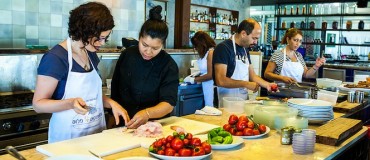
Much of Morocco’s argan oil still comes from nuts excreted by goats. The fabulously expensive oil is now produced in Israel – without goat droppings.
Ever get the feeling that you’re barking up the wrong tree? Well, this goat up a tree is bleating with joy at his favorite nosh: argan nuts. As Karin revealed to us in this post about argan oil production, in Morocco, Berber women process argan nuts the laborious traditional way till this day. Recently in 2022, the UN has updated argan as one of 12 at-risk plant products.
First, goats are set free in the argan groves and allowed to eat the yellow mature fruit. They excrete the indigestible nuts, which are gathered, cleaned and broken open, revealing an oil-rich kernel. Lightly roasted, the kernels yield oil with the deep, nutty taste so highly prized in the foodie world. Extracted raw, it is used as a cosmetic. If we’re to believe what we’re told about how miraculously argan oil reverses damage to skin and hair, it’s worth the expense. Current prices go as high as US$50 for 100 ml. (Makes you want to run to the kitchen and simmer some butter to make smen.)
The traditional Moroccan method, where women sit together on the floor and crush the kernels in a hand-held quern, yields 1 liter of oil over several day’s work. Today these women work in co-operatives, and most of the argan oil from Morocco still comes from their hands. Some oil is press- or solvent-extracted as well, for cosmetic and laboratory use.
 The Moroccan argan tree itself balances on the slippery slope of extinction. Overgrazed by hungry goats and chopped down for wood by poor locals hungry for fuel, there are less than half the trees that there were 50 years ago in Morocco (Wikipedia). Although UNESCO and other bodies have set up reserves where the trees are protected, the soil and climate conditions that the trees need meet only in very small areas. And the native Moroccan variety won’t thrive anywhere else in the world.
The Moroccan argan tree itself balances on the slippery slope of extinction. Overgrazed by hungry goats and chopped down for wood by poor locals hungry for fuel, there are less than half the trees that there were 50 years ago in Morocco (Wikipedia). Although UNESCO and other bodies have set up reserves where the trees are protected, the soil and climate conditions that the trees need meet only in very small areas. And the native Moroccan variety won’t thrive anywhere else in the world.
But there is hope for argan oil lovers. An Israeli company, Sivan S.M., has developed a strain of argan tree called “Argan 100,” which not only thrives in the Arava valley, the Negev, and Ashkelon, it bears ten times the amount of fruit that the Moroccan tree does. Hopefully these new crops will eventually bring the price down.
And the other good news is – the oil is extracted by pressing. No goats need apply.
About another good-for-you and affordable oil:
Photo of goat in argan tree by Rh69 via Wikimedia Commons
Photo of Berber women grinding argan kernels by Chrumps via Wikipedia.



Considering how inaccurate this article is, I wonder if it does not indeed need a complete rewrite. While many of the articles on this site are suspect, and peculiarly biased greenwashing of the Israelis state (uprooting trees, destroying jerusalem and using depleted uranium and white phosphorus weapons as it does), we’re now expected to think that the exploitation of nature by Israelis is indeed a good thing, while the small environmentally safe cottage industries of the Arab states are in fact deficient. Wow.
Goolam, if a country other than Israel has developed something to fuel and supply an industry would you say the same? Your comment reeks of racism.
greedy isreal
Dr. Andrews, please see the following link: http://www.greenprophet.com/2011/10/argan-oil-expert-estimates-about-20000-trees-in-israel/
Out of curiosity, which source claims that argan trees in Israel are cloned? Unless rooting stock from a mother tree can be called cloning, I suppose. Easy to throw scary words like “cloned,” “synthetic,” and “modified” around. Please prove your claims.
Have been working for 25yrs with Original argan oil from morocco and have been 12 times to see the development.
In morocco all argan is made by hand picked nuts, this goat-claim is a false claim to promote semi systhetic non-green gen ‘argan’ oil from ‘isreal’.
I will and can not use any clone argan oil for my studies thats why i stick with the original argan oil from morocco. All natural and not modified.
Thank you for your kind comment, Truth. You might find the following post of interest: http://www.greenprophet.com/2011/10/argan-oil-expert-estimates-about-20000-trees-in-israel/
This article is a load of rubbish where it states that the oil produced in morocco is via ecscreated nuts from the goats!.
Also they state they now have developed a strain of argan tree called “Argan 100,” “developed a strain” what exactly does that mean? We all know the this particular tree is not found any where in the world except for the south / south – west of morocco, so impossible that they have this tree in israel.
Sounds like a load of crap to me..
I think there has been a misrepresentation of “Argan 100” and the company who is marketing it. They have not developed a new strain of tree nor does it grow in Israel. They also cannot own the trees as they are thousands of years old and grow in a protected biosphere in Morocco, the only place they can grow. They only claim that they do the extraction themselves, most likely by machine or other type of non manual processing. Here are their own words from their website:
“Who We Are
Founded by a group of Argan tree growers, Sivan S.M. produces and markets 100% pure Argan oil that helps people like you to look and feel great. We extract our high-quality, organic Argan oil from the fruit of the Argan trees we grow in southwest Morocco. Rich in vitamin E and fatty acids, our 100% natural and pure Argan oil is perfect for cosmetic, medicinal and culinary purposes.”
They claim that other companies dilute their argan oil and they don’t. This is why they say their argan oil is better — which is basically a lot of hype.
Quite honestly there is nothing special about what they are doing in terms of argan oil. They are trying make money and perhaps being a little misleading .
Yes, Youssef, I’m hearing from others as well, about how the goat production line is no longer in use. It does seem to have been the traditional way up till recently.
Sorry but that’s a myth, mostly for tourist consumption. Most of the Argan oil produced in Morocco now is from nuts picked by hand. Goats are of course feeding from the trees still, unfortunately, in communal and wild grazing areas, but they are not allowed near fruiting ones, and certainly not in individually owned groves. Argan has proved to be too valuable a crop to be left for goats.
Good luck for Israeli production, I am all for low water consumption agriculture, but I wonder how the new strain of trees has been “developed”. Ten times the crop is suspiciously too wonderful a result to be obtained by selection and breeding, but I hope it is. And how much fertilizers does it need? Does it grow in the same poor soils as the original tree? How does it reproduce? Is a contamination of the original population to be feared if they come in contact?
Maybe you should contact the company and write a small addendum if they respond.
I love how so much traditional arts, crafts and food is actually done by hand in Morocco. We are used to seeing that “made in China” label wherever we go, but in Morocco’s markets, like in Fez, and Marrakesh, you can actually see craftsman working on their wares.